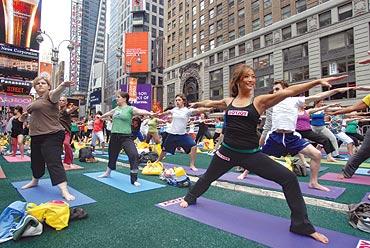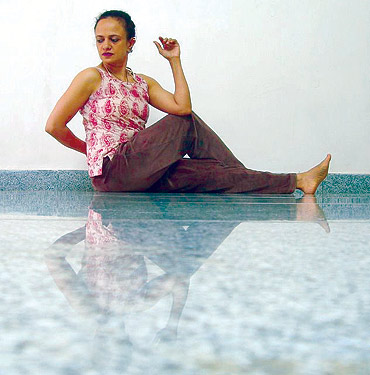Is it a Hindu thing? Is it a 'mongrel' tradition? Is it merely exercise? Arthur J Pais explores the debate that has America in a knot
One of the first things Connecticut-born, Florida-raised Dr Aseem Shukla learned in his very early years from his mother was to do the Surya Namaskar. He did the series of yoga exercises before he went to school; he did it during the vacations or when traveling with his family. It was his introduction to yoga and his interest in it grew as the years passed; it became firmer with the family visits to Gujarat and other Indian states.
Shukla, an associate professor in urologic surgery at the University of Minnesota medical school and co-founder and board member of the Hindu American Foundation, created quite a stir a few months ago when he wrote an article in The Washington Post complaining about the 'theft of yoga.'
Shukla, 41, bemoaned that it had become quite fashionable to present yoga without any reference to Hinduism. Soon, that morphed into the HAF's Take Back Yoga campaign.
The controversy over who can lay claim to yoga continued to grow, drawing in bestselling writers, Christian thinkers, Marxist professors, and reporters from dozens of newspapers and television channels.
An estimated 16 million (1.6 crore) Americans including agnostics and atheists practice yoga, which generates according to the Yoga Journal $5.7 billion annually in class fees, books and video sales, sale of mats and other accessories. There are an estimated 100,000 yoga instructors in the United States, including two men in New York City who offer yoga to taxi drivers.
Arguing by Shukla's side was Sheetal Shah, a New York-based HAF leader who has an MSc in development management from the London School of Economics. She came to America with her parents at age 3 about two decades ago, and learned yoga first watching her father, businessman Dhiru Shah, do difficult stretches at their Atlanta home.
Even Indian gurus and yoga teachers have often offered yoga without acknowledging its Hindu roots, Shukla and Shah complain.
"Yoga, meditation, Ayurvedic natural healing, self-realisation -- they are today's syntax for New Age, Eastern, mystical, even Buddhist, but nary an appreciation of their Hindu origins," Shukla wrote in the Post.
"When I said Hindus must take back yoga and reclaim the intellectual property of their spiritual heritage," he told Rediff-India Abroad, "and when I insisted that Hindus not sell out for the expediency of winning more clients for the yoga studio down the street, I was not talking of any copyright on yoga. I did not expect a huge controversy either."
As a child studying in America, he -- like Shah -- felt that Hinduism was not properly presented in the classrooms or in many textbooks. "It was to many people a religion of the monkey god, of cow worship and many other stereotypes," Shukla said. "Even those who loved yoga had stereotype notions about Hinduism."
The controversy ballooned when New Age guru Deepak Chopra, author of over a dozen bestselling books and a devotee of yoga, asserted that nobody can own yoga.
 |
"The whole point of yoga," wrote Chopra, who was raised a Hindu but who insists he stopped calling himself a Hindu over two decades ago, "is to achieve enlightenment, and that the most revered practitioners, whether known as yogis, swamis or mahatmas, transcend religion In fact, even if yoga were granted a patent or copyright by the United States Patent Office, there is no denying that enlightenment has always been outside the bounds of religion. That's where the spiritual path leads, not into the arms of priests or yoga instructors. Before Hindu Americans complain about hatha yoga (what is regarded as exercise-based postural yoga) being deracinated, they might want to promote the ideas that are the very essence of Indian spirituality, which preceded Shiva, Krishna, cows and castes."
'Satan doesn't care if you stretch'
Image: Yogacharya Shameem AkhtarMarxists and liberals also jumped into the debate.
"All the hatha yoga classics are the works of Nath siddhas," wrote Meera Nanda, a visiting professor of history of science at the Indian Institute of Science Education and Reserach, Mohali, Punjab, in an essay recently calling the siddhas "grassroots alchemists, sorcerers, yogis and fakirs who sought immortality in their own bodies and in this life The hatha yoga asanas they developed were meant to make the body strong and immune from death -- not to still the mind to realise the pure soul, or purusa, as the Yoga Sutra teaches."
Even Swami Vivekananda criticized hatha yoga, she asserted.
"In his lectures on Raja Yoga, delivered before admiring audiences in New York, Vivekananda interpreted Patanjali's Yoga Sutras as providing a 'scientific' method for 'seeing god,' -- indeed, 'becoming god' and acquiring 'absolute power' over all of nature," Nanda wrote.
"His interpretation of Yoga Sutras by no means reflected the mainstream of Hindu thought in India at that time, but was tailor-made to provide a practical guide to Western seekers of spiritual wisdom. Very much in tune with the scholarly fashions of his day, Vivekananda looked down upon hatha yoga, calling it 'nothing but a kind of gymnastics' which can help 'a man live long, but only (as) a healthy animal," she wrote.
Nanda's article, widely attacked and challenged by the HAF, also argued that 'modern postural yoga has borrowed key movements, rhythms and sequences from the Western traditions of body-building, gymnastics, drills and dances.'
She went on to say that "modern yoga was, of course, put together in India, by Indians, but with a whole lot of Western input. So let us not be so touchy and such purists about its Vedic-Hindu origins. Let us enjoy the mongrel that this thing called modern yoga is."
Even if yoga has borrowed from the West, Shukla argued, one cannot deny that it is a part of the Hindu religion. Adding to the controversy were evangelical Christians who denounced yoga -- even sans mention of Hinduism -- as the devil's tool. They even condemned the fast-growing 'Christian yoga' concept that combines physical yoga with Christianity -- similar to bhakti yoga postures with Christian chants.
 |
"It's everywhere," fumed former New Age practitioner and yoga follower Laurette Willis who is now a born again Christian and leading a popular movement to wean people away from yoga in America. She offers an exercise regime with Christian chants and meditative thoughts.
"In ads for everything from IT to ice cream, meditative supermodels sit cross-legged in the Hindu Lotus position, contemplating 'nirvana'. There are yoga videos for pregnant mothers, senior citizens, toddlers and babies -- even yoga for you and your dog," she said.
Not long ago, Reverend Mark Driscoll of Seattle's Mars Hill Church is reported to have told followers, 'If you sign up for a little yoga class, you're signing up for a little demon class Satan doesn't care if you stretch as long as you go to hell."
Albert Mohler, president of the Louisville, Kentucky-based Southern Baptist Theological Seminary, argued in an essay that yoga's spiritual and physical dimensions can't be separated. "When Christians practice yoga," he insisted, "they must either deny the reality of what yoga represents or fail to see the contradictions between their Christian commitments and their embrace of yoga."
Stories on yoga controversies continue to appear in publications across the US. In April, the Religious Life Office at Princeton University is holding a debate at which Sheetal Shah will assert that yoga is rooted firmly in Hinduism.
The opponents will question the claim or at least argue that yoga can be practiced with no reference to Hinduism. Shah could hear arguments like the ones offered by Amanda Gregg, who instructs yoga class at Georgia's Northside Drive Baptist Church.
'Hinduism doesn't have the exclusive hold on yoga'
In a recent CNN feature on yoga controversies, Gregg, who said she is respectful of Hinduism, argued, "Although Hinduism and yoga grew out at the same time of the Indian subcontinent and there are references to yoga in the Upanishads and in the Bhagvad Gita, that doesn't mean that Hinduism has the exclusive hold on yoga. Sort of like Jews don't have the exclusive hold on prayer."
Considering tea-sipping America's fascination with South Asian curry and Bollywood films, the debate over yoga is likely to return, Eric Rothgery, an expert on South Asian religions, told a Virginia newspaper recently.
"It's a question of how we define Hinduism, how we define yoga," Rothgery, professor of religion, Roanoke College, Salem Virginia, reportedly said.
Shah argued that she and others in the HAF do not claim that Hinduism should have a right over yoga.
"We feel that yoga is everywhere, it is very cool," she said. "We want Americans, especially the kids, to know that it not only came from India but from the Hindu religion. Hinduism often gets short shift in schools It is often associated with caste, cow worship, and with millions of gods, with idol worship. We think if people realise that yoga is part of Hinduism, they can feel good about the Hindu religion."
Shah attends a yoga studio in New York and is at peace with people who learn yoga as a physical discipline. "I will never say that they should think of Hindu spirituality while they do yoga," she said. "But if people want to think of Hindu meditation and use it along with yoga, it would be wonderful."
The debate is also about the Hindu identity in North America, Diana L Eck, Harvard University professor and founder of the Pluralism Project, has said.
While there are many groups fighting for Indian-American interests in business and politics, Shah, Aseem Shukla and the HAF have emerged as 'the first major national advocacy group looking at Hindu identity,' Eck told The New York Times.
 |
Shukla hoped the debate would bring pride not only to the first two generations of Hindus in America, but also the third.
"When our children are in school," he said, "wouldn't it be wonderful if their classmates and teachers share their pride in Hinduism and acknowledge that Hinduism gave the world yoga?"




article